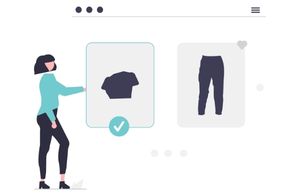Or go to our Shopify Theme Detector directly
Do You Pay Tax on Dropshipping?
Last modified: April 23, 2024

Are you looking to establish a new dropshipping business but asking yourself: Do you pay tax on dropshipping? There are many different types of tax that you might need to pay. So here is a quick rundown for you.
| # | Name | Image | |
|---|---|---|---|
| 1 |

|
AutoDS
|
|
| 2 |
|
Spocket-World Wide Suppliers
|
|
| 3 |

|
Syncee - Global Dropshipping
|
|
| 4 |

|
Printful-Sell Printed and Embroidered Items
|
|
| 5 |

|
Sup Dropshipping
|
|
| 6 |

|
DSers-AliExpress Dropshipping
|
|
| 7 |

|
Zendrop - Dropshipping & POD
|
|
| 8 |

|
Dropshipman: Dropshipping & POD
|
|
| 9 |

|
AO - AliExpress Dropshipping by FireApps
|
|
| 10 |

|
Trendsi - Fashion Dropshipping
|
|
| 11 |

|
CJdropshipping
|
|
| 12 |

|
DropCommerce
|
|
| 13 |

|
Modalyst-Sell Brand Name Products
|
|
| 14 |

|
Ali Orders-Fulfill Orders Easily
|
|
| 15 |

|
Blanka - Private Label Beauty
|
|
| 16 |

|
Dropified-Automate Your Dropshipping Business
|
|
| 17 |

|
ProductPro
|
|
| 18 |

|
Spreadr App
|
|
| 19 |

|
Importify
|
|
| 20 |

|
Inventory Source
|
|
| 21 |

|
Roxie
|
|
| 22 |

|
Fulfillbot: Dropshipping Agent
|
|
| 23 |

|
KakaClo
|
|
| 24 |

|
Oberlo-Get the Best Produtcts for Your Site
|
|
|
Show More
|
|||
Do You Pay Tax on Dropshipping?
Yes, there are taxes that you need to pay when you’re dropshipping. Depending on your specific business model when dropshipping and where you’re selling to and from will depend on the exact taxes that you will need to pay.
For instance, if you’re selling in the US, the taxes can be different based on the state that you’re in. While in the UK, you might need to pay tax depending on how much you’re earning like those who earn more than £85,000 need to pay VAT, but those who are selling less than this don’t pay any tax.
In the US, you might need to pay Income and Sales Tax. These are very important. And if you’re importing products for your customers, then might need to be custom and exercise taxes that you need to pay. Or if you’re exporting products to customers, then you might need to pay exporting taxes.
To ensure that you’re meeting your tax requirements, it is always better to speak to an accountant.
There are also ways that you can manage your tax amounts. Several tax apps can help you calculate how much you will owe. These can help you add costs to your products on dropshipping.
How to Manage Taxes on Your Shopify Dropshipping Store
Using Shopify is one of the best ways that you can dropship to the world. There are lots of apps that can help you build a website and find the products that you need to sell to your customers. In addition to this, some options allow you to manage your accounts and taxes with ease. These apps can be easy or there are some premium options.
Remember that managing your taxes can also be better if you use an accountant. Sometimes they can let you know of ways that you can save on your tax bill by finding costs in your dropshipping business that can be claimed against your taxes and reduce your tax burden.
Furthermore, if you prefer managing your dropshipping business on the go, there are mobile apps available that allow you to efficiently handle various aspects, including product sourcing, order management, and customer communication, all from your phone.
Understanding Taxes in Dropshipping
Types of Taxes in Dropshipping
Dropshipping businesses face the complex task of managing a multitude of taxes, each with its own unique implications. These taxes encompass income tax, which is levied on the profits generated by your dropshipping endeavors.
Understanding whether dropshipping is legal or not in your jurisdiction is crucial, as it directly impacts your tax obligations and business operations.
Income and Sales Tax
The income tax adds another layer of intricacy to the landscape of dropshipping operations. This tax, assessed on the profits you accrue from your business, comes with regional variations.
Source and Customs Duty Taxes
The financial facets of dropshipping extend beyond income and sales taxes. Source tax pertains to the payments made to your suppliers when acquiring products for your business.
Managing Tax Obligations
Calculating Tax Amounts
Determining the amount of taxes owed in the world of e-commerce can be complex. To ensure accurate calculations, leverage tax management applications or seek guidance from a qualified accountant.
Tax Exemptions and Reductions
Optimizing your tax liabilities as an e-commerce entrepreneur by exploring tax exemptions available for resale purposes and go to legal avenues to reduce your income tax burden.
Compliance and Reporting
Many e-commerce platforms like Shopify offer automated tax collection and reporting features. You can streamline your tax-related processes, reduce the risk of errors, and focus on growing your online business.
Considering whether to establish an LLC for dropshipping purposes is also essential for managing your business structure and legal obligations effectively.
Conclusion: Do You Pay Tax on Dropshipping?
If you’re wondering: do you pay tax on dropshipping? Then the answer is definitely yes. However, you need to speak to an expert to help you understand which taxes you need to pay and what the costs will be for you. Understanding this early can allow you to better manage your finances and ensure that you’re not left short when it comes to paying your taxes. And if in doubt, you can always use one of the Shopify tax app.
Keep on reading about Dropshipping on Shopify. For example Can I Dropship From Walmart? and How Long Has Dropshipping Been Around?. Both part of our Shopify Dropshipping Apps and Shopify Dropshipping Themes lists. You can read more about Dropshipping on Shopify with our ultimate Dropshipping on Shopify guide.
-
Can dropshipping businesses claim tax deductions on business expenses?
Absolutely, dropshipping businesses can claim tax deductions on business expenses. These deductions reduce the overall taxable income of your business, ultimately lowering the amount of taxes you owe.
-
Can dropshippers use tax exemption certificates for purchases?
Certainly, dropshippers can often use tax exemption certificates when making purchases. Tax exemption certificates are valuable tools that allow businesses to purchase goods without paying sales tax under specific circumstances.
-
Can dropshipping businesses be audited for tax compliance?
Yes, dropshipping businesses can be subject to tax audits to verify their compliance. Tax audits are conducted by tax authorities to ensure that businesses are reporting their income, deductions, and tax liabilities.




 PageFly Landing Page Builder
PageFly Landing Page Builder  Shopify
Shopify  SEMrush
SEMrush  Website Maintenance
Website Maintenance  UpPromote
UpPromote